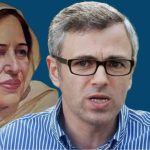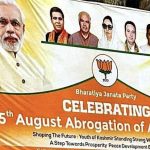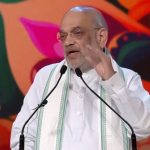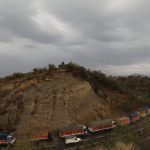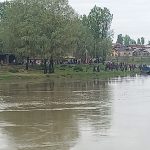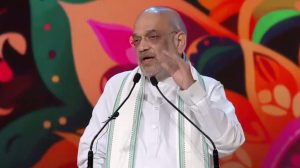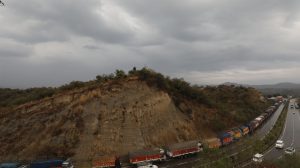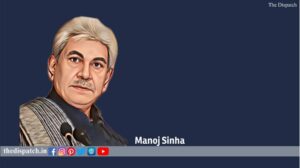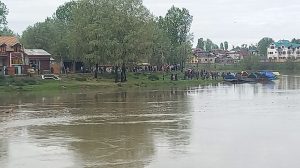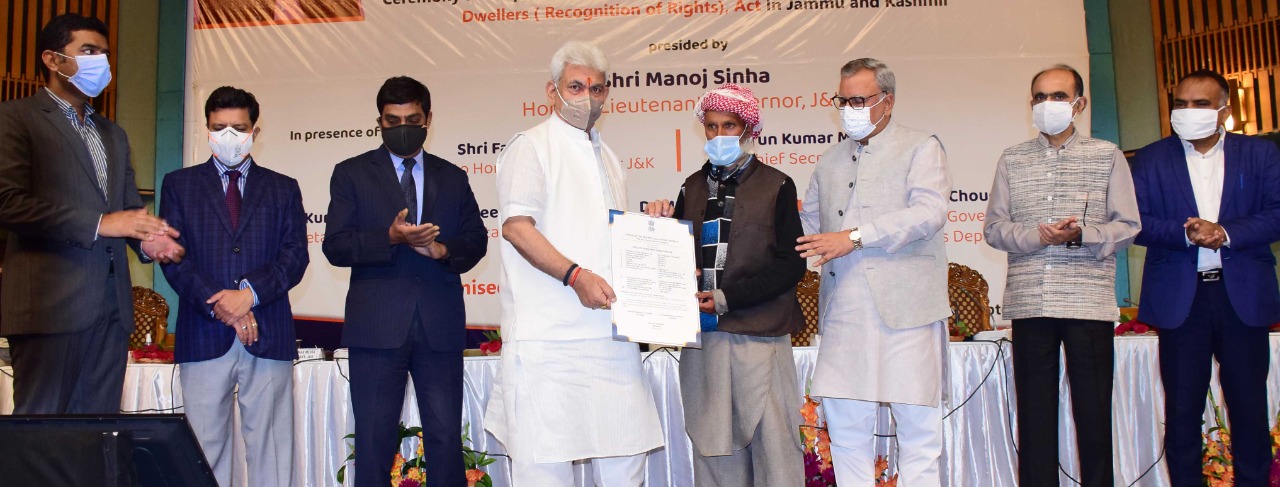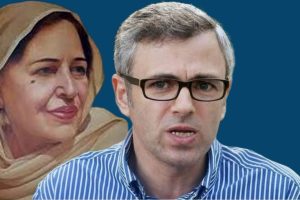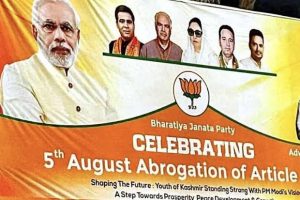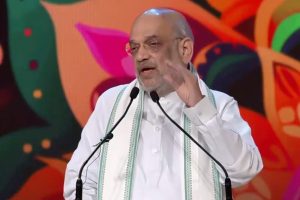Personally reached out by the Congress leadership including Prime Ministers Jawaharlal Nehru and Indira Gandhi, longtime critical support mass of the National Conference to significant expansion material for the Peoples Democratic Party, the Gujjar and Bakerwal tribal communities of Jammu and Kashmir are increasingly becoming admirers of an unusual person they didn’t even know until a year ago.
The Gujjars and Bakerwals numbering over a million –though figures are disputed –have always remained at the center of conflict-laced political projects and the national security loom, but there were hardly any material gains for the community. From filling up the back rows of political rallies to being admired as the country’s second line of defence –for being border area dwellers, mainly –their position was hardly ever considered for elevation beyond the obvious decorative value.
This decorative value brought fortunes for the ‘vendors’ who became millionaires through political routes but the overall social condition of the Gujjars and Bakerwals didn’t see any significant elevation to be able to live a dignified life. Laws necessary for the empowerment of community were never enacted, the political reservation, as applicable to Scheduled Tribes in other parts of the country, was never allowed to enter Jammu and Kashmir.
In the last eight to ten months, a slew of laws, focused attention to community welfare, healthcare, education, micro businesses and lifestyle linked entrepreneurship has put the Gujjar and Bakwerwals in social and political spotlight. When all this is happening without demand, lure or coercion for votes, the community has reason to see in Lieutenant Governor Manoj Sinha their most sincere sympathizer ever who refuses to seek credit for the political party he belongs to. Given no reason to worry about coercion or to see themselves through any particular political perspective, they are getting frank and respectful to Sinha.
At a public event in Rajouri district last year, a local Gujjar leader listed a number of demands –roads, schools, health clinics and microfinance etc –and then went on say, LG Sahab you focus on these issues, get us these basic things done, people will put over 70 seats in BJP’s laps”. This was taken with applause by the audience. As Sinha came up to speak, he responded to the issues but also chose a very polite way to say: “someone said about the seats (electoral gains), but I am on an oath of constitution to work for people without any political affiliation or interest”.
This was not the only occasion when Sinha steered himself clear of requirements of BJP for local electoral gains. The Lieutenant Governor’s conspicuous disassociation from the party politics gives not only Gujjars but also everyone else genuine opportunity to be aspirational without necessary barter of political commitments.
Gujjars have bitter experience of being politically used. When Sheikh Mohammad Abdullah’s position was unsettled by New Delhi in 1953, Prime Minister Nehru used to personally reach out to the Gujjars in his bid to have a large community solidly backing the post Sheikh political environment. Nehru would often visit Gujjars and even stay in community populated areas such Mohand Marg, Pahalgam and Sonamarg.
When Indira Gandhi picked direct confrontation with Farooq Abdullah in 1983 elections, she banked majorly on Gujjars who supported Congress in a big way.
Along these decades of Nehru and Indira, the Gujjars continued to fight for their inclusion in Scheduled Tribe which didn’t find right kind of ears in New Delhi. At one point a top Gujjar leader took a trunk-load of papers carrying signatures of people demanding ST status. This prayer was finally answered in 1991 when Jammu and Kashmir was under Governor’s rule and the Center had a non-Congress government.
While the Congress engagement continued across the decades, the National Conference described Gujjars as natural ally because of matrilineal background of Sheikh’s wife. Upon its launch in 1999, the Peoples Democratic Party keenly invested itself in weaning this community away from the National Conference.
In this long battle of controlling the political space, Gujjar became a material of desire for every party but no one delivered back on their most original requirements –the legal right to dwell in forests and reservation in legislature, even as Scheduled Tribes in rest of the country enjoyed these privileges.
Gujjars: Post the August 5
Looking at the high political development from the margins for decades, the Gujjars emerged key beneficiaries of the monumental changes of August 5, 2019 event. Many would still be nostalgic about the so-called special status but there is general consensus among the community elites that political reservation –as committed in Jammu and Kashmir Reorganisation Act –would have never come in the pre-August 5 environment. This can safely be said on the basis of three-decade-long struggle for inclusion in ST and further three-decade-long struggle for the political reservation. When the next elections happen, Gujjars will have Assembly constituencies reserved as per the percentage of their population. This will be a constitutionally guaranteed assurance for a certain numbers of tribal people in the legislature.
The post-August 5 political environment has also enhanced the visibility of Gujjars in the administrative system. At present three of the ten districts in Kashmir Valley have Gujjar Deputy Commissioners, including the Srinagar district. All of them are IAS officers. When Srinagar got first Gujjar Deputy Commissioner –Shahid Choudhary –the community saw this historic as no Gujjar ever since 1947 had such an opportunity. There are a number of other Gujjar officers at key positions including the DIG of Udhampur-Reasi Police Range. While a Gujjar judicial officer has recently been cleared for elevation as High Court Judge –first-ever –another was last year sent to the UT Public Service Commission. All this recognition of merit is happening at a time when there are no political pressure groups to make things happen for the community.
Forest Rights Act: the feel good factor
The breakneck speed with which the rights to dwell in the forest areas are being conferred to the eligible people has greatly enhanced the ‘feel-good’ factor among the Gujjar tribe. Flagged as focus area under Prime Minister Vajpayee in 1999, enacted by Parliament in 2006 under Manmohan Singh, the Forest Rights Act was put to implementation nationally in 2008. However, this historic piece of legislation couldn’t enter Jammu and Kashmir under the pretext of Article 370. The Gujjars have for a long time questioned this blockage even as a number of central laws made way to the erstwhile state merely by cabinet concurrence. It was in December 2020 that Lieutenant Governor Manoj Sinha ordered for gearing up the process following due legal backing.
People associated with the implementation process say that the speed has been unprecedented as the key departments –the Forest Department and Tribal Affairs Department –as also the Deputy Commissioners have been clearly given to understand that this is Lieutenant Governor’s priority focus area. The LG, however, makes it clear at every event that he is just implementing what is a matter of personal attention of Prime Minister Narendra Modi.
“If there is one person who deserves entire credit, that is Prime Minister Narendra Modi”, Sinha said at an event in Srinagar on September 13. He added, “On being appointed as Lieutenant Governor in August 2020, when I called on Prime Minister, he asked me to have the Forest Rights Act implemented with all the sincerity”.
The implementation of the Forest Rights Act removes a historical injustice as it provides legal instrument to the communities which have dwelled in and around forests for centuries together. In recent years the absence of law saw the tribal communities facing manifold troubles with political parties drawing advantages from the frequent conflicts instead of finding long term solution. Under the PDP-BJP regime, the Gujjar-Bakerwal tribal communities came under tremendous stress as never seen before. The BJP, which held the Forest department, launched massive eviction drives which were protested against by the PDP. The two parties messaged their separate constituencies at the cost of pain and trouble to the tribal communities. On June 19, 2018, when BJP pulled support from the PDP, Mehbooba Mufti said at her Srinagar press conference “protection of Gujjar communities in Jammu region was one of the reasons that our party joined hands with the BJP”. This statement stood in abject ridicule as no efforts were made for implementation of the Forest Rights Act across three and half years of PDP-BJP regime.
Sinha to tribes
In the months of September alone, Sinha had three major interactions with the tribal communities. Here are some of the highlights from what he said at these events. “We have formulated a robust mechanism to ensure these rights are decided at the grassroots level in consultation with PRIs and forest department.” Terming the Forests Rights as the basic right of tribal population, the LG said that with the complete implementation of Forest Rights Act 2006 in the UT, the interests of communities dependent on forest resources, and whose existence is incomplete without forests are safeguarded. The UT administration is steadfast for their holistic development and prosperity.
The government has launched various schemes to extend best education and medical facilities, besides offering sustainable employment opportunities to the youth from tribal community. Plan has also been finalized to build transit accommodation for migratory population and develop tribal villages as Model villages. Work on transit accommodation will start soon in tribal areas of Kandi, Thanamandi in Rajouri, Behram Gala in Poonch and Udhampur and Ramban along the National Highway. Similar plan is for Dubjan and Lal Ghulam in Shopian and along NH in Pulwama
Sinha says that after Independence, many Tribal representatives made the demand for safeguarding their right to education, healthcare, and on forest produce, which was not impossible to achieve but even after decades, the tribal community of J&K could not get their rights. “I want to assure you that the UT administration is committed to protect your interests and whatever difficulties or obstacles may come, we will work to remove them from the way of your development and prosperity”, added the Lt Governor.
Listing out various initiatives the UT administration has taken for the welfare of tribals, the Lt Governor said that transit accommodation in Rajouri, Poonch, Udhampur, and Ramban will also have medical facilities for tribal people and veterinary dispensary for their cattle.
Some of the initiatives are Tribal Health Plan, health sub-centre, mobile medical care units for the migratory population; Tribal Bhavans in Jammu, Srinagar and Rajouri; 1500 mini sheep farms for sustainable livelihood of tribal community and making them financially capable.; Selecting 500 tribal youth for specialized skill development programmes including Commercial Pilots, Management, hospitality training etc.; Setting up 16 Milk Villages to connect at least 2000 youth to the dairy sector at the cost of Rs 16 crore, besides providing training, branding, marketing and transport facilities to the youth.
Community feedback
While the beneficiaries who have got the certificates of rights have their hands raised in prayers, those in the queue are a happy lot. Newspapers since September 13 are flooded with statements of gratitude. The Gurjardesh Charitable Trust, an iconic institute of the Gujjar tribe which had Sonia Gandhi among the visitors in the recent past, has placed on record their gratitude for the Prime Minister and Lieutenant Governor Sinha for the implementation of the Forests Rights Act. Its Chairman, Advocate SM Choudhary, and others members addressed a press conference in Jammu to acknowledge their LG’s initiatives and make a request for further simplifying the process. Javed Rahi, a noted tribal rights activist of national fame, says that the implementation of the Tribal Rights Act is the second major ‘gift’ to the Gujjars after their inclusion in the Scheduled Tribes in 1991.
